Report: Individual Differences and Social Psychology Theories
VerifiedAdded on 2020/07/22
|9
|2197
|177
Report
AI Summary
This report provides an overview of social psychology, defining it as the scientific examination of how individuals are influenced by others. It explores individual differences and responses to interpersonal rejection, a powerful and disturbing experience. The report delves into various theories, including evolutionary psychology, cognitive theory, attribution theory, self-perception theory, self-verification, social exchange theory, and structural social psychology. Each theory is examined in detail, highlighting its key concepts and applications in understanding human behavior and interactions. The report emphasizes the importance of these theories in explaining how individuals perceive, interpret, and respond to social situations, particularly in the context of rejection and the formation of relationships. The report concludes by reiterating the significance of social psychology as an experiential science, answering questions about human behavior through hypothesis testing.
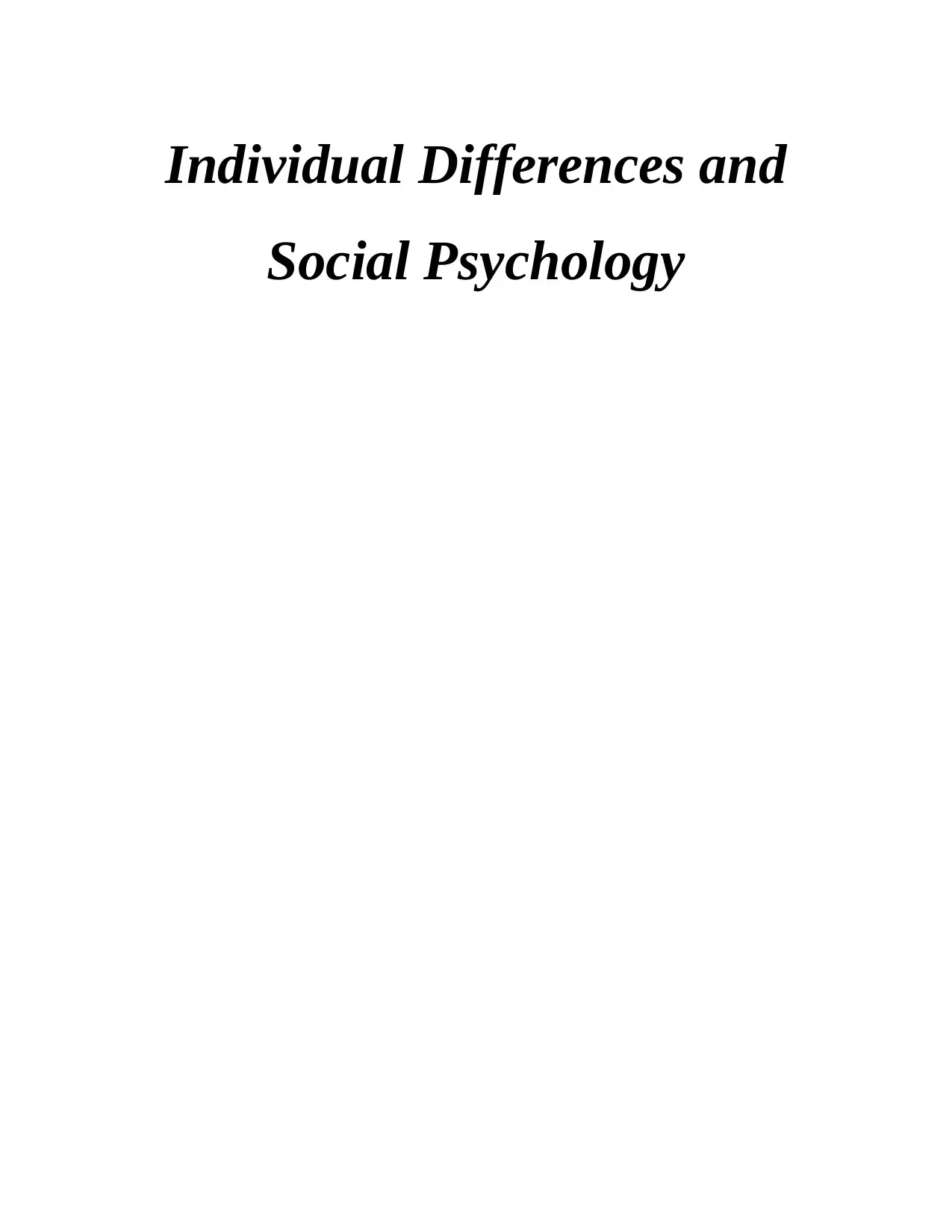
Individual Differences and
Social Psychology
Social Psychology
Paraphrase This Document
Need a fresh take? Get an instant paraphrase of this document with our AI Paraphraser


⊘ This is a preview!⊘
Do you want full access?
Subscribe today to unlock all pages.

Trusted by 1+ million students worldwide
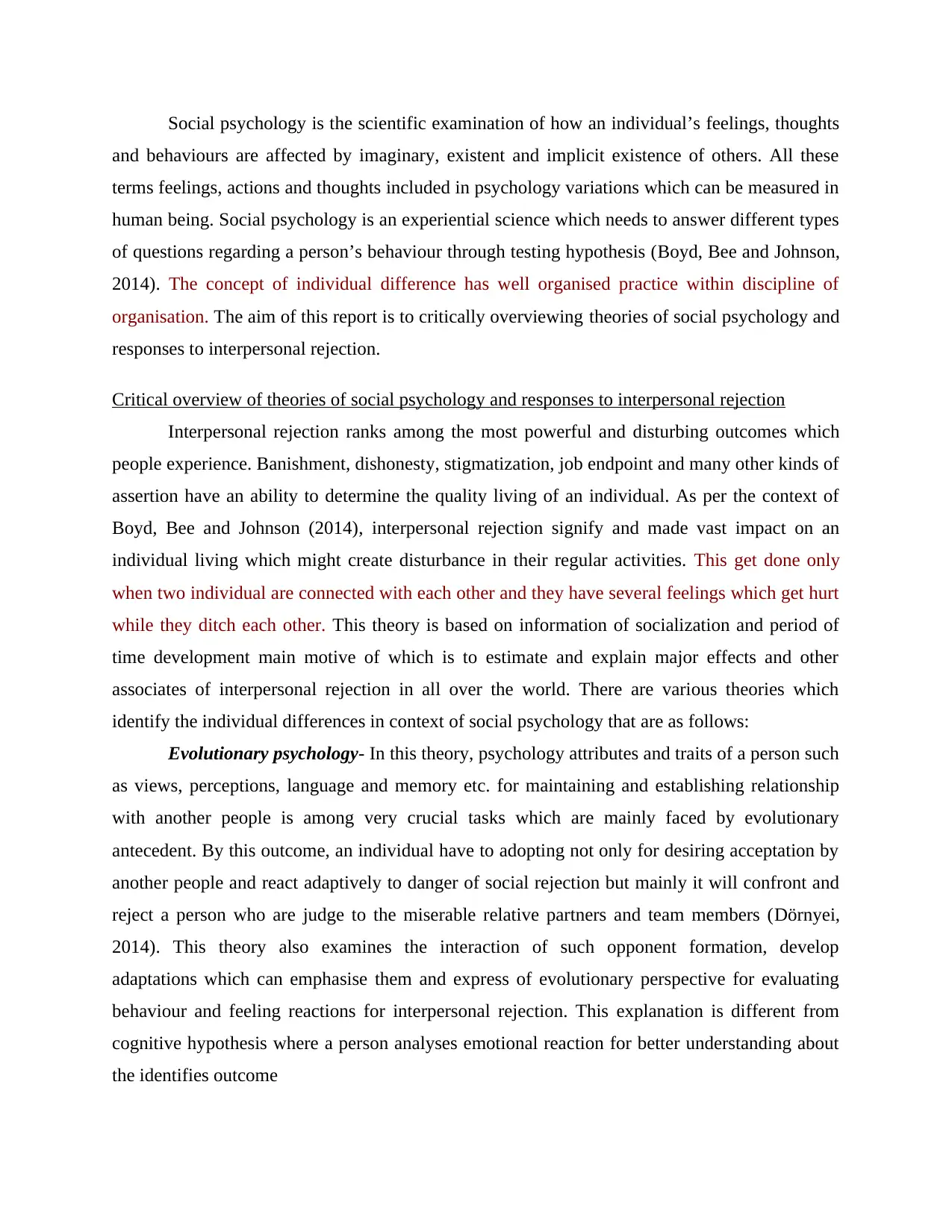
Social psychology is the scientific examination of how an individual’s feelings, thoughts
and behaviours are affected by imaginary, existent and implicit existence of others. All these
terms feelings, actions and thoughts included in psychology variations which can be measured in
human being. Social psychology is an experiential science which needs to answer different types
of questions regarding a person’s behaviour through testing hypothesis (Boyd, Bee and Johnson,
2014). The concept of individual difference has well organised practice within discipline of
organisation. The aim of this report is to critically overviewing theories of social psychology and
responses to interpersonal rejection.
Critical overview of theories of social psychology and responses to interpersonal rejection
Interpersonal rejection ranks among the most powerful and disturbing outcomes which
people experience. Banishment, dishonesty, stigmatization, job endpoint and many other kinds of
assertion have an ability to determine the quality living of an individual. As per the context of
Boyd, Bee and Johnson (2014), interpersonal rejection signify and made vast impact on an
individual living which might create disturbance in their regular activities. This get done only
when two individual are connected with each other and they have several feelings which get hurt
while they ditch each other. This theory is based on information of socialization and period of
time development main motive of which is to estimate and explain major effects and other
associates of interpersonal rejection in all over the world. There are various theories which
identify the individual differences in context of social psychology that are as follows:
Evolutionary psychology- In this theory, psychology attributes and traits of a person such
as views, perceptions, language and memory etc. for maintaining and establishing relationship
with another people is among very crucial tasks which are mainly faced by evolutionary
antecedent. By this outcome, an individual have to adopting not only for desiring acceptation by
another people and react adaptively to danger of social rejection but mainly it will confront and
reject a person who are judge to the miserable relative partners and team members (Dörnyei,
2014). This theory also examines the interaction of such opponent formation, develop
adaptations which can emphasise them and express of evolutionary perspective for evaluating
behaviour and feeling reactions for interpersonal rejection. This explanation is different from
cognitive hypothesis where a person analyses emotional reaction for better understanding about
the identifies outcome
and behaviours are affected by imaginary, existent and implicit existence of others. All these
terms feelings, actions and thoughts included in psychology variations which can be measured in
human being. Social psychology is an experiential science which needs to answer different types
of questions regarding a person’s behaviour through testing hypothesis (Boyd, Bee and Johnson,
2014). The concept of individual difference has well organised practice within discipline of
organisation. The aim of this report is to critically overviewing theories of social psychology and
responses to interpersonal rejection.
Critical overview of theories of social psychology and responses to interpersonal rejection
Interpersonal rejection ranks among the most powerful and disturbing outcomes which
people experience. Banishment, dishonesty, stigmatization, job endpoint and many other kinds of
assertion have an ability to determine the quality living of an individual. As per the context of
Boyd, Bee and Johnson (2014), interpersonal rejection signify and made vast impact on an
individual living which might create disturbance in their regular activities. This get done only
when two individual are connected with each other and they have several feelings which get hurt
while they ditch each other. This theory is based on information of socialization and period of
time development main motive of which is to estimate and explain major effects and other
associates of interpersonal rejection in all over the world. There are various theories which
identify the individual differences in context of social psychology that are as follows:
Evolutionary psychology- In this theory, psychology attributes and traits of a person such
as views, perceptions, language and memory etc. for maintaining and establishing relationship
with another people is among very crucial tasks which are mainly faced by evolutionary
antecedent. By this outcome, an individual have to adopting not only for desiring acceptation by
another people and react adaptively to danger of social rejection but mainly it will confront and
reject a person who are judge to the miserable relative partners and team members (Dörnyei,
2014). This theory also examines the interaction of such opponent formation, develop
adaptations which can emphasise them and express of evolutionary perspective for evaluating
behaviour and feeling reactions for interpersonal rejection. This explanation is different from
cognitive hypothesis where a person analyses emotional reaction for better understanding about
the identifies outcome
Paraphrase This Document
Need a fresh take? Get an instant paraphrase of this document with our AI Paraphraser
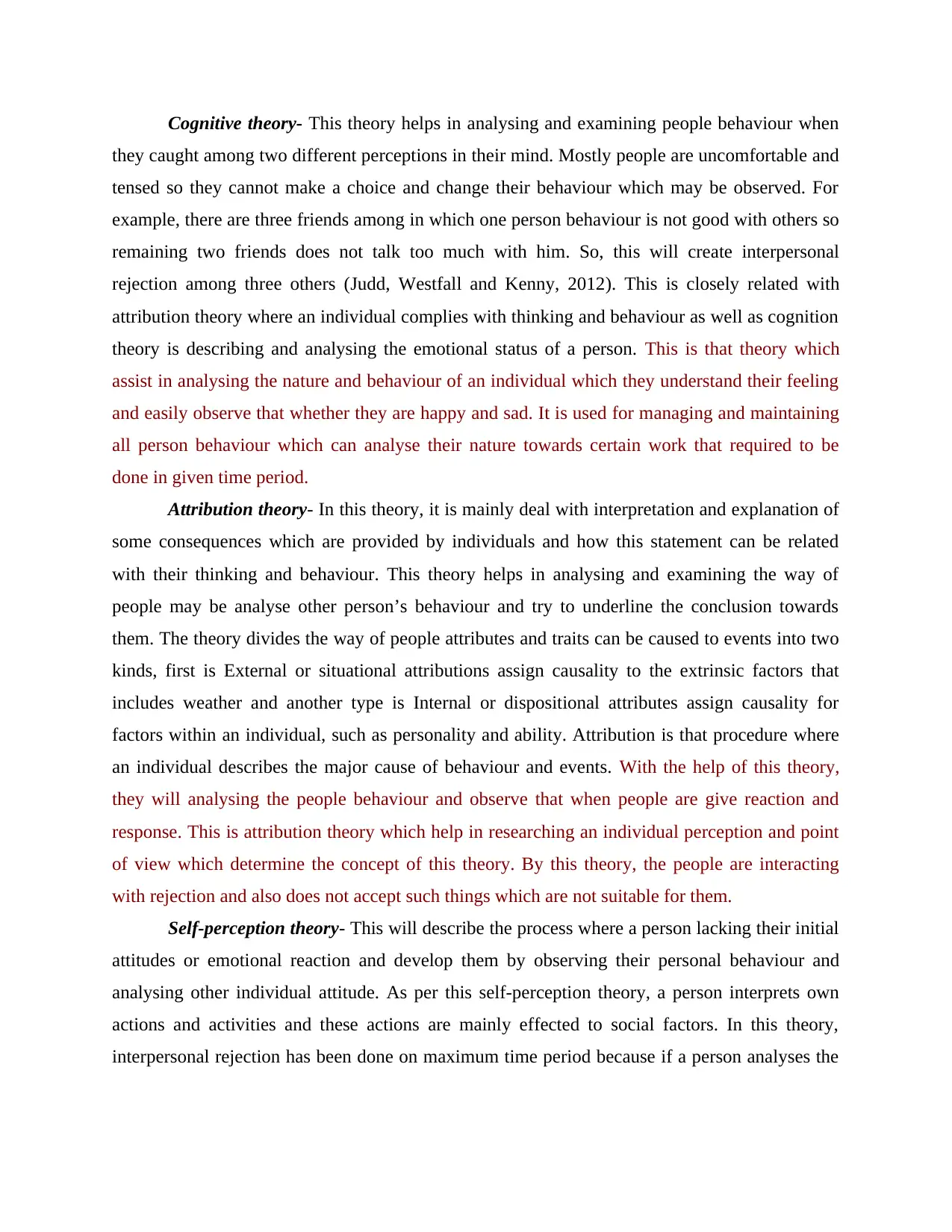
Cognitive theory- This theory helps in analysing and examining people behaviour when
they caught among two different perceptions in their mind. Mostly people are uncomfortable and
tensed so they cannot make a choice and change their behaviour which may be observed. For
example, there are three friends among in which one person behaviour is not good with others so
remaining two friends does not talk too much with him. So, this will create interpersonal
rejection among three others (Judd, Westfall and Kenny, 2012). This is closely related with
attribution theory where an individual complies with thinking and behaviour as well as cognition
theory is describing and analysing the emotional status of a person. This is that theory which
assist in analysing the nature and behaviour of an individual which they understand their feeling
and easily observe that whether they are happy and sad. It is used for managing and maintaining
all person behaviour which can analyse their nature towards certain work that required to be
done in given time period.
Attribution theory- In this theory, it is mainly deal with interpretation and explanation of
some consequences which are provided by individuals and how this statement can be related
with their thinking and behaviour. This theory helps in analysing and examining the way of
people may be analyse other person’s behaviour and try to underline the conclusion towards
them. The theory divides the way of people attributes and traits can be caused to events into two
kinds, first is External or situational attributions assign causality to the extrinsic factors that
includes weather and another type is Internal or dispositional attributes assign causality for
factors within an individual, such as personality and ability. Attribution is that procedure where
an individual describes the major cause of behaviour and events. With the help of this theory,
they will analysing the people behaviour and observe that when people are give reaction and
response. This is attribution theory which help in researching an individual perception and point
of view which determine the concept of this theory. By this theory, the people are interacting
with rejection and also does not accept such things which are not suitable for them.
Self-perception theory- This will describe the process where a person lacking their initial
attitudes or emotional reaction and develop them by observing their personal behaviour and
analysing other individual attitude. As per this self-perception theory, a person interprets own
actions and activities and these actions are mainly effected to social factors. In this theory,
interpersonal rejection has been done on maximum time period because if a person analyses the
they caught among two different perceptions in their mind. Mostly people are uncomfortable and
tensed so they cannot make a choice and change their behaviour which may be observed. For
example, there are three friends among in which one person behaviour is not good with others so
remaining two friends does not talk too much with him. So, this will create interpersonal
rejection among three others (Judd, Westfall and Kenny, 2012). This is closely related with
attribution theory where an individual complies with thinking and behaviour as well as cognition
theory is describing and analysing the emotional status of a person. This is that theory which
assist in analysing the nature and behaviour of an individual which they understand their feeling
and easily observe that whether they are happy and sad. It is used for managing and maintaining
all person behaviour which can analyse their nature towards certain work that required to be
done in given time period.
Attribution theory- In this theory, it is mainly deal with interpretation and explanation of
some consequences which are provided by individuals and how this statement can be related
with their thinking and behaviour. This theory helps in analysing and examining the way of
people may be analyse other person’s behaviour and try to underline the conclusion towards
them. The theory divides the way of people attributes and traits can be caused to events into two
kinds, first is External or situational attributions assign causality to the extrinsic factors that
includes weather and another type is Internal or dispositional attributes assign causality for
factors within an individual, such as personality and ability. Attribution is that procedure where
an individual describes the major cause of behaviour and events. With the help of this theory,
they will analysing the people behaviour and observe that when people are give reaction and
response. This is attribution theory which help in researching an individual perception and point
of view which determine the concept of this theory. By this theory, the people are interacting
with rejection and also does not accept such things which are not suitable for them.
Self-perception theory- This will describe the process where a person lacking their initial
attitudes or emotional reaction and develop them by observing their personal behaviour and
analysing other individual attitude. As per this self-perception theory, a person interprets own
actions and activities and these actions are mainly effected to social factors. In this theory,
interpersonal rejection has been done on maximum time period because if a person analyses the
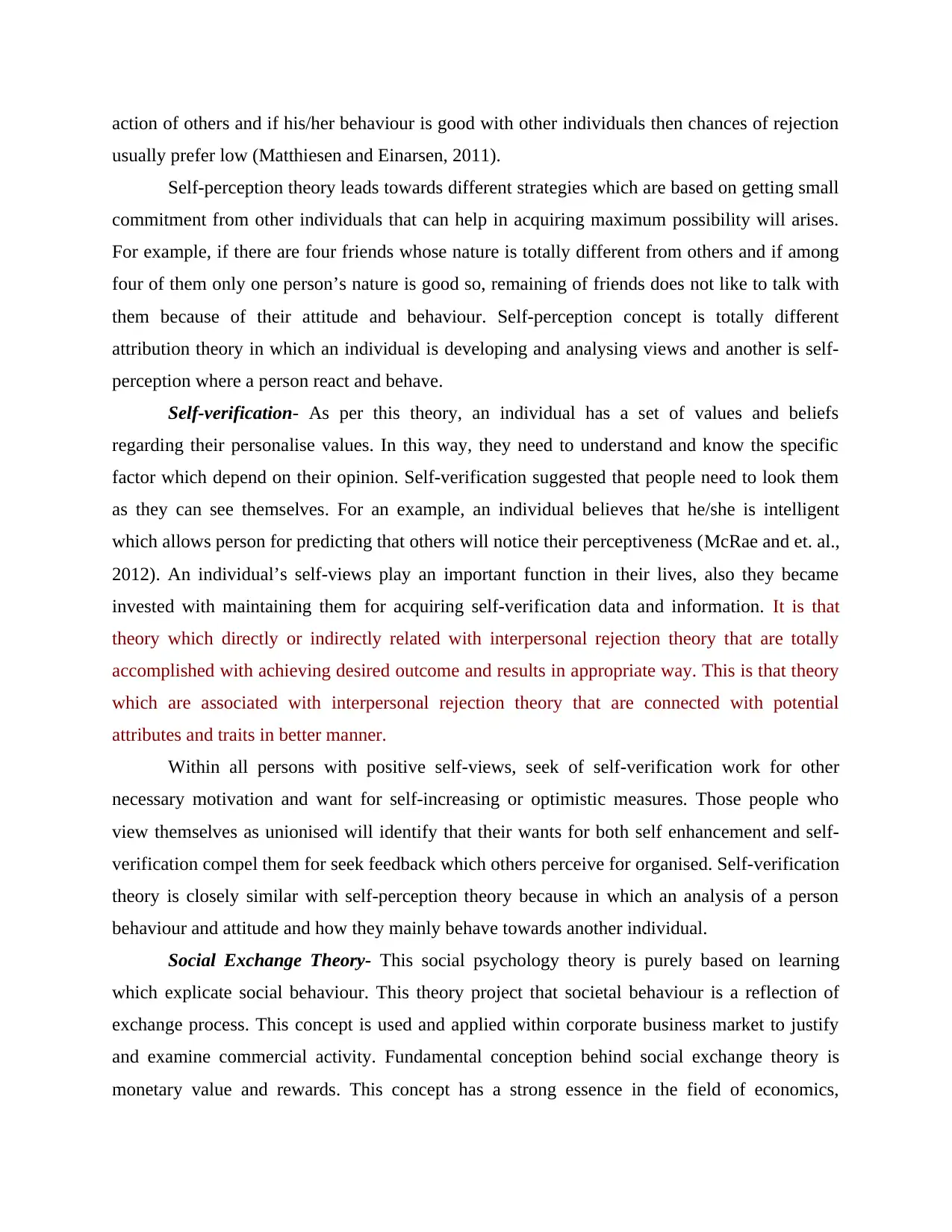
action of others and if his/her behaviour is good with other individuals then chances of rejection
usually prefer low (Matthiesen and Einarsen, 2011).
Self-perception theory leads towards different strategies which are based on getting small
commitment from other individuals that can help in acquiring maximum possibility will arises.
For example, if there are four friends whose nature is totally different from others and if among
four of them only one person’s nature is good so, remaining of friends does not like to talk with
them because of their attitude and behaviour. Self-perception concept is totally different
attribution theory in which an individual is developing and analysing views and another is self-
perception where a person react and behave.
Self-verification- As per this theory, an individual has a set of values and beliefs
regarding their personalise values. In this way, they need to understand and know the specific
factor which depend on their opinion. Self-verification suggested that people need to look them
as they can see themselves. For an example, an individual believes that he/she is intelligent
which allows person for predicting that others will notice their perceptiveness (McRae and et. al.,
2012). An individual’s self-views play an important function in their lives, also they became
invested with maintaining them for acquiring self-verification data and information. It is that
theory which directly or indirectly related with interpersonal rejection theory that are totally
accomplished with achieving desired outcome and results in appropriate way. This is that theory
which are associated with interpersonal rejection theory that are connected with potential
attributes and traits in better manner.
Within all persons with positive self-views, seek of self-verification work for other
necessary motivation and want for self-increasing or optimistic measures. Those people who
view themselves as unionised will identify that their wants for both self enhancement and self-
verification compel them for seek feedback which others perceive for organised. Self-verification
theory is closely similar with self-perception theory because in which an analysis of a person
behaviour and attitude and how they mainly behave towards another individual.
Social Exchange Theory- This social psychology theory is purely based on learning
which explicate social behaviour. This theory project that societal behaviour is a reflection of
exchange process. This concept is used and applied within corporate business market to justify
and examine commercial activity. Fundamental conception behind social exchange theory is
monetary value and rewards. This concept has a strong essence in the field of economics,
usually prefer low (Matthiesen and Einarsen, 2011).
Self-perception theory leads towards different strategies which are based on getting small
commitment from other individuals that can help in acquiring maximum possibility will arises.
For example, if there are four friends whose nature is totally different from others and if among
four of them only one person’s nature is good so, remaining of friends does not like to talk with
them because of their attitude and behaviour. Self-perception concept is totally different
attribution theory in which an individual is developing and analysing views and another is self-
perception where a person react and behave.
Self-verification- As per this theory, an individual has a set of values and beliefs
regarding their personalise values. In this way, they need to understand and know the specific
factor which depend on their opinion. Self-verification suggested that people need to look them
as they can see themselves. For an example, an individual believes that he/she is intelligent
which allows person for predicting that others will notice their perceptiveness (McRae and et. al.,
2012). An individual’s self-views play an important function in their lives, also they became
invested with maintaining them for acquiring self-verification data and information. It is that
theory which directly or indirectly related with interpersonal rejection theory that are totally
accomplished with achieving desired outcome and results in appropriate way. This is that theory
which are associated with interpersonal rejection theory that are connected with potential
attributes and traits in better manner.
Within all persons with positive self-views, seek of self-verification work for other
necessary motivation and want for self-increasing or optimistic measures. Those people who
view themselves as unionised will identify that their wants for both self enhancement and self-
verification compel them for seek feedback which others perceive for organised. Self-verification
theory is closely similar with self-perception theory because in which an analysis of a person
behaviour and attitude and how they mainly behave towards another individual.
Social Exchange Theory- This social psychology theory is purely based on learning
which explicate social behaviour. This theory project that societal behaviour is a reflection of
exchange process. This concept is used and applied within corporate business market to justify
and examine commercial activity. Fundamental conception behind social exchange theory is
monetary value and rewards. This concept has a strong essence in the field of economics,
⊘ This is a preview!⊘
Do you want full access?
Subscribe today to unlock all pages.

Trusted by 1+ million students worldwide
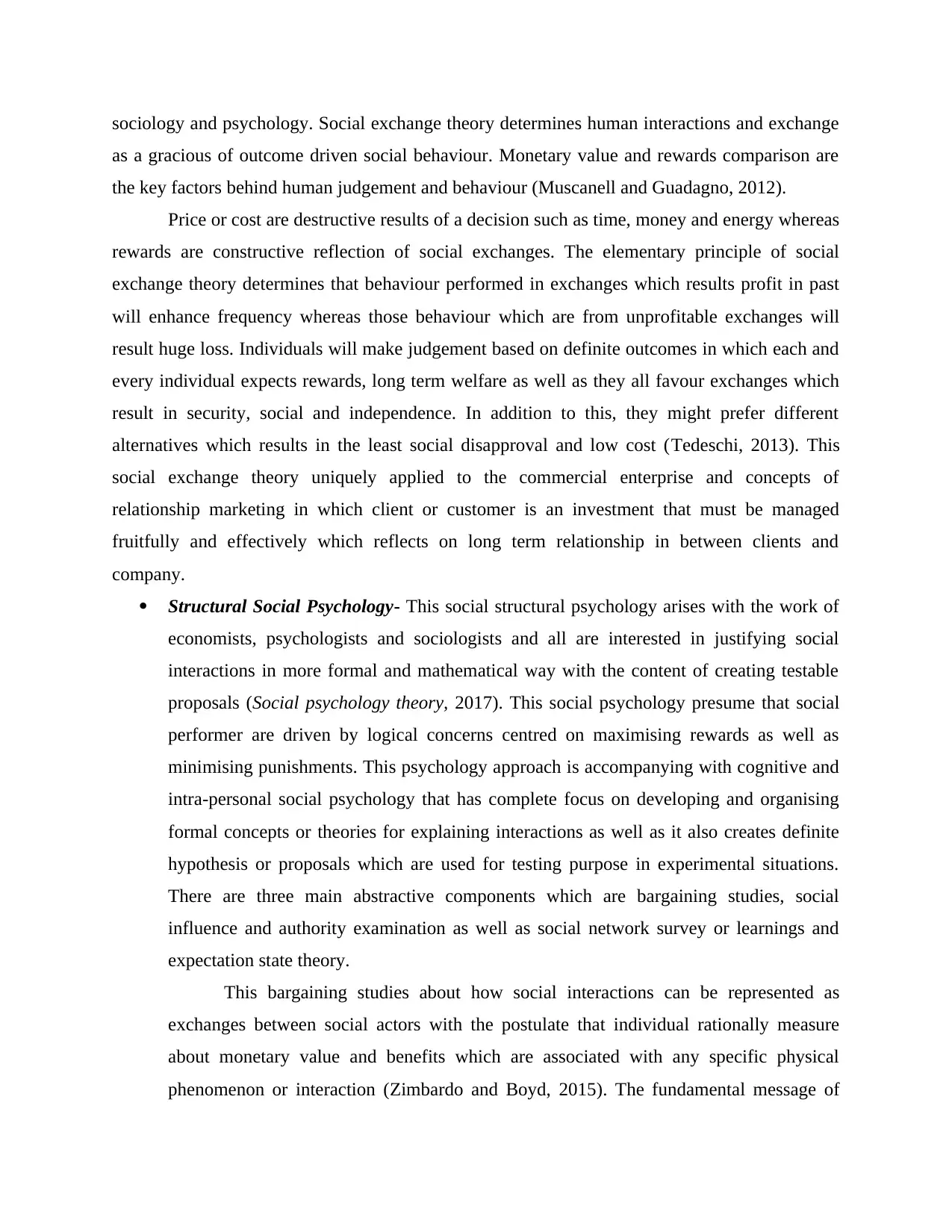
sociology and psychology. Social exchange theory determines human interactions and exchange
as a gracious of outcome driven social behaviour. Monetary value and rewards comparison are
the key factors behind human judgement and behaviour (Muscanell and Guadagno, 2012).
Price or cost are destructive results of a decision such as time, money and energy whereas
rewards are constructive reflection of social exchanges. The elementary principle of social
exchange theory determines that behaviour performed in exchanges which results profit in past
will enhance frequency whereas those behaviour which are from unprofitable exchanges will
result huge loss. Individuals will make judgement based on definite outcomes in which each and
every individual expects rewards, long term welfare as well as they all favour exchanges which
result in security, social and independence. In addition to this, they might prefer different
alternatives which results in the least social disapproval and low cost (Tedeschi, 2013). This
social exchange theory uniquely applied to the commercial enterprise and concepts of
relationship marketing in which client or customer is an investment that must be managed
fruitfully and effectively which reflects on long term relationship in between clients and
company.
Structural Social Psychology- This social structural psychology arises with the work of
economists, psychologists and sociologists and all are interested in justifying social
interactions in more formal and mathematical way with the content of creating testable
proposals (Social psychology theory, 2017). This social psychology presume that social
performer are driven by logical concerns centred on maximising rewards as well as
minimising punishments. This psychology approach is accompanying with cognitive and
intra-personal social psychology that has complete focus on developing and organising
formal concepts or theories for explaining interactions as well as it also creates definite
hypothesis or proposals which are used for testing purpose in experimental situations.
There are three main abstractive components which are bargaining studies, social
influence and authority examination as well as social network survey or learnings and
expectation state theory.
This bargaining studies about how social interactions can be represented as
exchanges between social actors with the postulate that individual rationally measure
about monetary value and benefits which are associated with any specific physical
phenomenon or interaction (Zimbardo and Boyd, 2015). The fundamental message of
as a gracious of outcome driven social behaviour. Monetary value and rewards comparison are
the key factors behind human judgement and behaviour (Muscanell and Guadagno, 2012).
Price or cost are destructive results of a decision such as time, money and energy whereas
rewards are constructive reflection of social exchanges. The elementary principle of social
exchange theory determines that behaviour performed in exchanges which results profit in past
will enhance frequency whereas those behaviour which are from unprofitable exchanges will
result huge loss. Individuals will make judgement based on definite outcomes in which each and
every individual expects rewards, long term welfare as well as they all favour exchanges which
result in security, social and independence. In addition to this, they might prefer different
alternatives which results in the least social disapproval and low cost (Tedeschi, 2013). This
social exchange theory uniquely applied to the commercial enterprise and concepts of
relationship marketing in which client or customer is an investment that must be managed
fruitfully and effectively which reflects on long term relationship in between clients and
company.
Structural Social Psychology- This social structural psychology arises with the work of
economists, psychologists and sociologists and all are interested in justifying social
interactions in more formal and mathematical way with the content of creating testable
proposals (Social psychology theory, 2017). This social psychology presume that social
performer are driven by logical concerns centred on maximising rewards as well as
minimising punishments. This psychology approach is accompanying with cognitive and
intra-personal social psychology that has complete focus on developing and organising
formal concepts or theories for explaining interactions as well as it also creates definite
hypothesis or proposals which are used for testing purpose in experimental situations.
There are three main abstractive components which are bargaining studies, social
influence and authority examination as well as social network survey or learnings and
expectation state theory.
This bargaining studies about how social interactions can be represented as
exchanges between social actors with the postulate that individual rationally measure
about monetary value and benefits which are associated with any specific physical
phenomenon or interaction (Zimbardo and Boyd, 2015). The fundamental message of
Paraphrase This Document
Need a fresh take? Get an instant paraphrase of this document with our AI Paraphraser
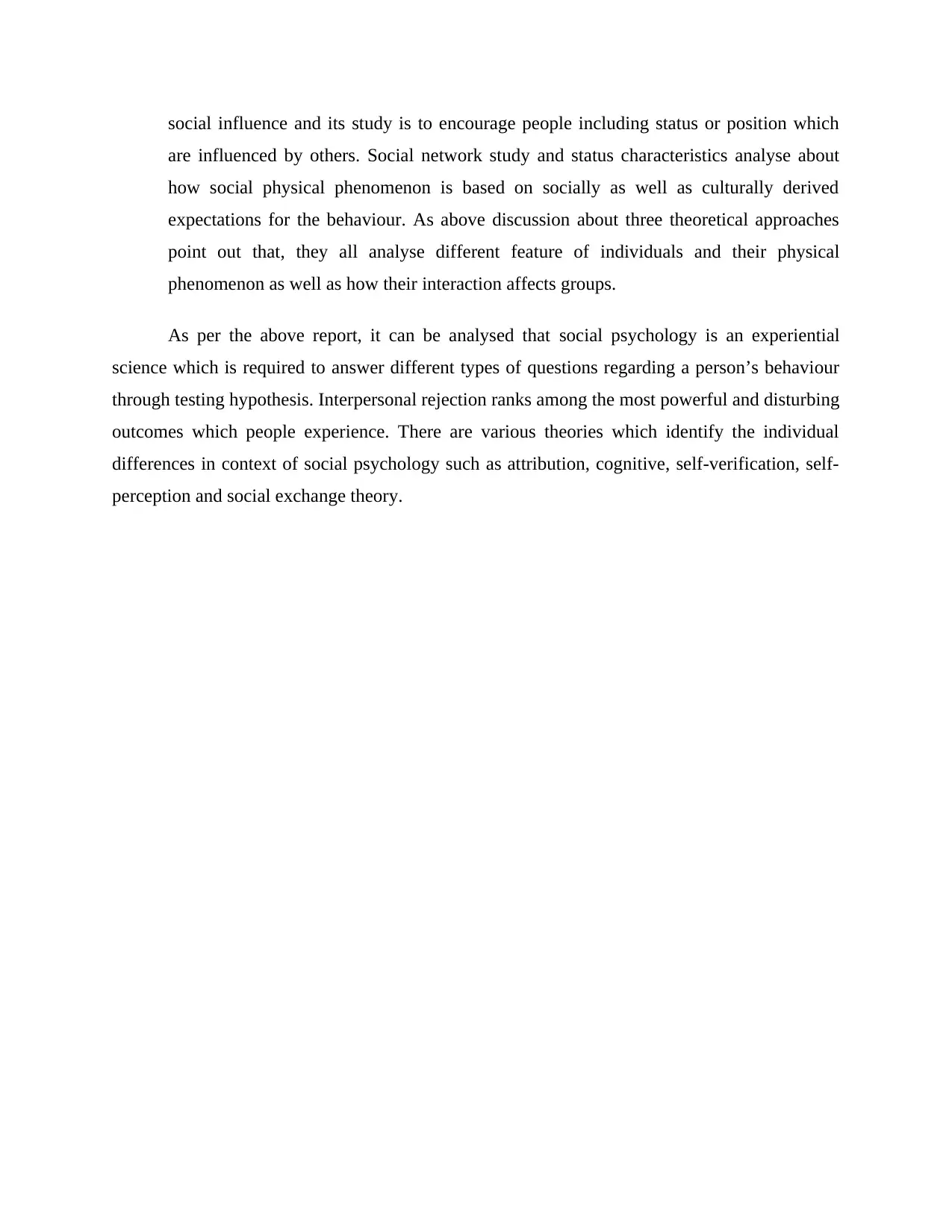
social influence and its study is to encourage people including status or position which
are influenced by others. Social network study and status characteristics analyse about
how social physical phenomenon is based on socially as well as culturally derived
expectations for the behaviour. As above discussion about three theoretical approaches
point out that, they all analyse different feature of individuals and their physical
phenomenon as well as how their interaction affects groups.
As per the above report, it can be analysed that social psychology is an experiential
science which is required to answer different types of questions regarding a person’s behaviour
through testing hypothesis. Interpersonal rejection ranks among the most powerful and disturbing
outcomes which people experience. There are various theories which identify the individual
differences in context of social psychology such as attribution, cognitive, self-verification, self-
perception and social exchange theory.
are influenced by others. Social network study and status characteristics analyse about
how social physical phenomenon is based on socially as well as culturally derived
expectations for the behaviour. As above discussion about three theoretical approaches
point out that, they all analyse different feature of individuals and their physical
phenomenon as well as how their interaction affects groups.
As per the above report, it can be analysed that social psychology is an experiential
science which is required to answer different types of questions regarding a person’s behaviour
through testing hypothesis. Interpersonal rejection ranks among the most powerful and disturbing
outcomes which people experience. There are various theories which identify the individual
differences in context of social psychology such as attribution, cognitive, self-verification, self-
perception and social exchange theory.
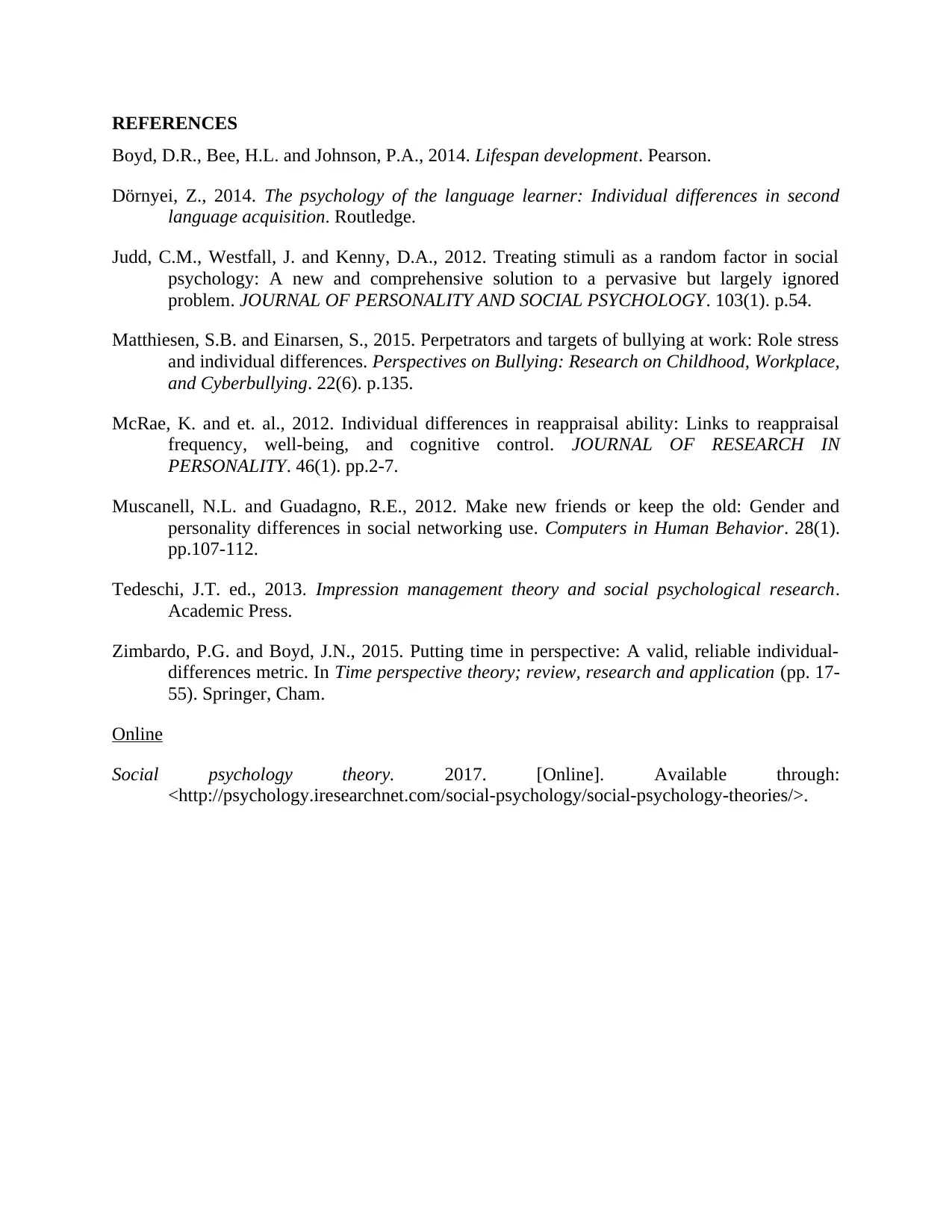
REFERENCES
Boyd, D.R., Bee, H.L. and Johnson, P.A., 2014. Lifespan development. Pearson.
Dörnyei, Z., 2014. The psychology of the language learner: Individual differences in second
language acquisition. Routledge.
Judd, C.M., Westfall, J. and Kenny, D.A., 2012. Treating stimuli as a random factor in social
psychology: A new and comprehensive solution to a pervasive but largely ignored
problem. JOURNAL OF PERSONALITY AND SOCIAL PSYCHOLOGY. 103(1). p.54.
Matthiesen, S.B. and Einarsen, S., 2015. Perpetrators and targets of bullying at work: Role stress
and individual differences. Perspectives on Bullying: Research on Childhood, Workplace,
and Cyberbullying. 22(6). p.135.
McRae, K. and et. al., 2012. Individual differences in reappraisal ability: Links to reappraisal
frequency, well-being, and cognitive control. JOURNAL OF RESEARCH IN
PERSONALITY. 46(1). pp.2-7.
Muscanell, N.L. and Guadagno, R.E., 2012. Make new friends or keep the old: Gender and
personality differences in social networking use. Computers in Human Behavior. 28(1).
pp.107-112.
Tedeschi, J.T. ed., 2013. Impression management theory and social psychological research.
Academic Press.
Zimbardo, P.G. and Boyd, J.N., 2015. Putting time in perspective: A valid, reliable individual-
differences metric. In Time perspective theory; review, research and application (pp. 17-
55). Springer, Cham.
Online
Social psychology theory. 2017. [Online]. Available through:
<http://psychology.iresearchnet.com/social-psychology/social-psychology-theories/>.
Boyd, D.R., Bee, H.L. and Johnson, P.A., 2014. Lifespan development. Pearson.
Dörnyei, Z., 2014. The psychology of the language learner: Individual differences in second
language acquisition. Routledge.
Judd, C.M., Westfall, J. and Kenny, D.A., 2012. Treating stimuli as a random factor in social
psychology: A new and comprehensive solution to a pervasive but largely ignored
problem. JOURNAL OF PERSONALITY AND SOCIAL PSYCHOLOGY. 103(1). p.54.
Matthiesen, S.B. and Einarsen, S., 2015. Perpetrators and targets of bullying at work: Role stress
and individual differences. Perspectives on Bullying: Research on Childhood, Workplace,
and Cyberbullying. 22(6). p.135.
McRae, K. and et. al., 2012. Individual differences in reappraisal ability: Links to reappraisal
frequency, well-being, and cognitive control. JOURNAL OF RESEARCH IN
PERSONALITY. 46(1). pp.2-7.
Muscanell, N.L. and Guadagno, R.E., 2012. Make new friends or keep the old: Gender and
personality differences in social networking use. Computers in Human Behavior. 28(1).
pp.107-112.
Tedeschi, J.T. ed., 2013. Impression management theory and social psychological research.
Academic Press.
Zimbardo, P.G. and Boyd, J.N., 2015. Putting time in perspective: A valid, reliable individual-
differences metric. In Time perspective theory; review, research and application (pp. 17-
55). Springer, Cham.
Online
Social psychology theory. 2017. [Online]. Available through:
<http://psychology.iresearchnet.com/social-psychology/social-psychology-theories/>.
⊘ This is a preview!⊘
Do you want full access?
Subscribe today to unlock all pages.

Trusted by 1+ million students worldwide
1 out of 9
Related Documents
Your All-in-One AI-Powered Toolkit for Academic Success.
+13062052269
info@desklib.com
Available 24*7 on WhatsApp / Email
![[object Object]](/_next/static/media/star-bottom.7253800d.svg)
Unlock your academic potential
Copyright © 2020–2026 A2Z Services. All Rights Reserved. Developed and managed by ZUCOL.





